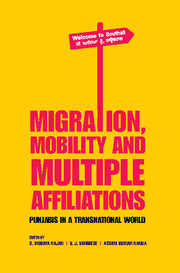Book contents
- Frontmatter
- Contents
- List of Tables and Figures
- Preface
- Acknowledgements
- Transnational World and Indian Punjab: Contemporary Issues
- Part I A Historical Survey
- Part II Shifting Contours of Migration
- Part III Social Structures and Organizational Links
- Part IV Education and Migration
- 11 Sending Children ‘Back Home’ for their (Mis)education
- 12 Transnational Health Institutions, Global Nursing Care Chains, and the Internationalization of Nurse Education in Punjab
- Part V Family Networks
- Contributors
- Index
11 - Sending Children ‘Back Home’ for their (Mis)education
from Part IV - Education and Migration
Published online by Cambridge University Press: 05 March 2016
- Frontmatter
- Contents
- List of Tables and Figures
- Preface
- Acknowledgements
- Transnational World and Indian Punjab: Contemporary Issues
- Part I A Historical Survey
- Part II Shifting Contours of Migration
- Part III Social Structures and Organizational Links
- Part IV Education and Migration
- 11 Sending Children ‘Back Home’ for their (Mis)education
- 12 Transnational Health Institutions, Global Nursing Care Chains, and the Internationalization of Nurse Education in Punjab
- Part V Family Networks
- Contributors
- Index
Summary
Introduction
‘Many Non-Resident Punjabis want their children to learn in Punjab’, read the headline of an article in online newspaper OneIndia.in on 4 February 2008. The story registers the substantial number of Punjabis based in North America who have sent their children to live with their grandparents in Punjab, to ensure that the children imbibe Punjabi values and traditions. The article tells a heartwarming success story about westernized NRI youth returning home and thriving on the positive religious and cultural traditions of the ancestral homeland. Parents are said to choose India for their children because they ‘learn more about love and relationships’ than from living in the west. Moreover, as a Canadian NRI father is quoted as saying in the article, education standards have improved tremendously in Punjab, and it's now possible to avail the very best of modern international education in Punjab itself. The article concludes with the endorsement of Amandeep Kaur, an NRI pupil born in the US, who thanks her parents for sending her to Punjab: ‘they are settled in the United States but I want to live here. I love India’.
This chapter explores the phenomenon of children being sent to school ‘back home’ in Punjab, and disrupts some of the rosy messages put forth by media coverage such as this newspaper article. Whilst this phenomenon illustrates the objectification of Indian culture and religion by migrant and diasporic parents in the west, the examples the author encountered during her fieldwork in 2009–10 demonstrated that culture cannot be packaged and instilled in children through schooling. The chapter suggests that this requires people to rethink popular conceptions of culture as morality.
Existing work on the ways in which children's education influences international migration has focussed on migration whereby children are sent to the West with their ‘study mothers’, or alone to boarding schools as ‘parachute kids’ in the hope of gaining portable skills and marketable qualifications (Zhou, 1998; Huang and Yeoh, 2005). However, this chapter highlights a reverse process, where migrant or diasporic parents stress their hopes for cultural and religious gains from education ‘back home’; qualities that have long been revered as the exclusive patrimony of India, as Partha Chatterjee (1993) observed of colonial India.
- Type
- Chapter
- Information
- Migration, Mobility and Multiple AffiliationsPunjabis in a Transnational World, pp. 281 - 295Publisher: Cambridge University PressPrint publication year: 2015
- 1
- Cited by



